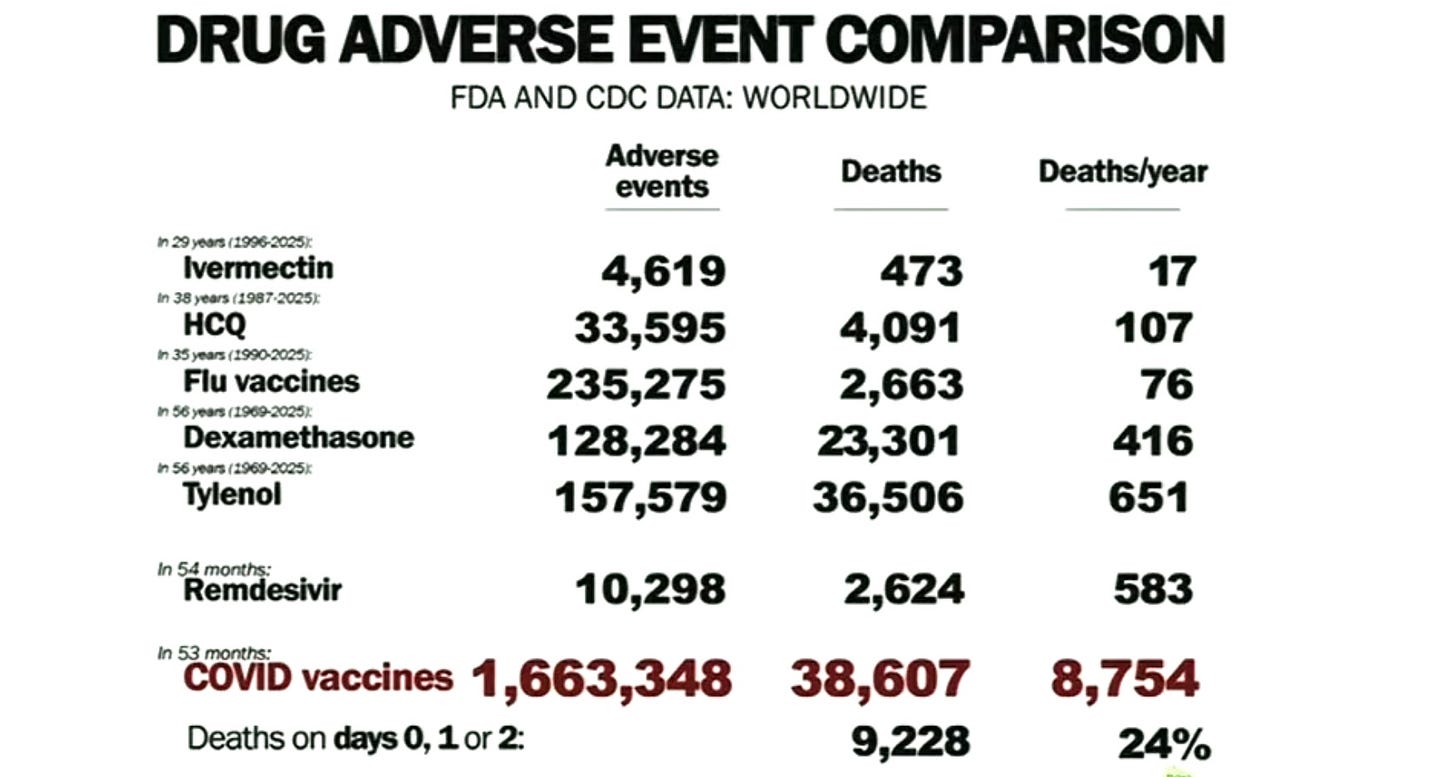Senate Hearing Reveals The Depth Of Covid Negligence
How Health Officials Downplayed and Hid Myocarditis and Other Adverse Events Due To The Covid-19 ‘Vaccine’
The chart above says it all.
Recent Senate hearings have intensified scrutiny over the COVID-19 vaccine's safety and efficacy narrative, challenging previous public health messaging. The adverse event data were clearly suppressed.
Senator Ron Johnson's interim report claims that federal health officials delayed public warnings about the risks associated with myocarditis and pericarditis associated with mRNA vaccines. Internal communications suggest concerns about appearing "alarmist," leading to delayed label updates and public messaging that downplayed risks. Physicians who raised concerns faced censorship, including suspensions of social media accounts.
Cardiologist Dr Peter McCullough testified that before Covid, he had seen two patients with myocarditis. Since Covid, he's examined thousands of patients with the problem. Also, he referred to multiple autopsies showing deaths within days of the vaccines, and the risks of the COVID-19 injection far outweigh any benefits. By April 2021, there were already 2,926 deaths recorded in VAERS, nearly half of which occurred within three days of injection. This was a figure drastically underreported.
Dr. Patrick Whelan reported challenges with the Vaccine Adverse Event Reporting System (VAERS), noting that the system failed to update a report after a child's death following vaccination. This incident underscores concerns about the system's effectiveness in capturing and updating critical safety data.
Then, there was natural immunity, which was overlooked. Dr Marty Makary testified that public health officials ignored data on natural immunity, making the U.S. an "international outlier" in this regard. Representative Mariannette Miller-Meeks shared personal experiences of being censored for discussing natural immunity, highlighting the suppression of alternative viewpoints.
Another primary concern was the variability of the vaccine lots. Investigations revealed significant variability in adverse events across different vaccine lots. One COVID-19 vaccine lot was associated with over 5,000 adverse reactions, while the worst flu vaccine lot had only 137. This disparity raises questions about manufacturing consistency and safety monitoring.
Science took a back seat to politics in influencing the timing of vaccine clinical trial result releases. A former Pfizer executive stated that the delay in releasing results until after the 2020 election was "not a coincidence," raising concerns about how public health decisions are made.
These hearings reflect a growing bipartisan concern over vaccine safety, transparency, and the influence of political factors on public health policies. The discussions emphasize improved data reporting systems and a more balanced approach to vaccine safety communication.
In a recent interview on the Daniel Horowitz podcast, Senator Johnson said the following:
"Bobby Kennedy is in a tough spot. We've got a man in the White House who will always cling to the fact that he saved tens of millions of lives with the vaccine. So they've got to tread lightly."
That's the problem. Everyone walks around on eggshells, worried about contradicting the great man.
Kennedy needs to strp up to the plate and should put a moratorium on the COVID-19 jabs. What's the worst thing that could happen? Does Kennedy get fired? Senator Johnson has done a tremendous job in shining the light on the nefarious actors in this Covid saga.
The whole thing doesn't make sense. Someone has to stand up for rational health principles along with protecting the public from the deadly genetic serum that has been so destructive since early 2021. We don't know how far-reaching into the future people will continue to suffer. It's time to end it—it's time to end it.
Below, you can watch a good portion of the hearings..




"We don't know how far-reaching into the future people will continue to suffer. It's time to end it—it's time to end it." Unfortunately, at least in court, if an issue is debatable, under deference doctrine, the government wins, and courts traditionally eschew speculative damages. So, at least in court, where, short of waiting for Congress to act, under Article III, we settle cases and controversies, the time to end is on hold.